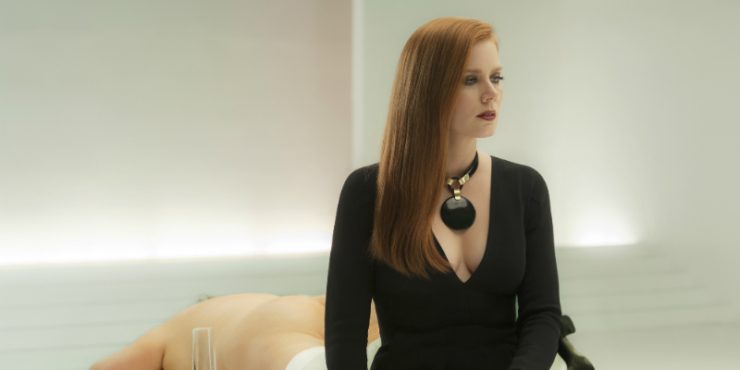Nocturnal Animals has two stories running concurrently with one another. Both are pieces of fiction, but one is a piece of fiction within the fiction of the film’s actual narrative. A visual artist (Amy Adams) is married to a distant, unfaithful businessman (Armie Hammer), she receives a galley copy of a novel written by her former husband (Jake Gyllenhaal), a sensitive, romantic man whose love she now realizes was more pure, more real. She reads the novel and that ends up being the other half of the film. In that story, a father (also played by Gyllenhaal), is driving cross-country with his wife (Isla Fisher) and daughter (Ellie Bamber), where they encounter a group of dangerous men, led by a sadistic troublemaker (Aaron Taylor-Johnson). The father gets in contact with a no-nonsense cop (Michael Shanon) when his wife and daughter are kidnapped. These two stories are meant to showcase different types of violence: one is visceral and real, produces a physical pain; the other is all emotional, completely internalized. I’m at a loss to find a reason as to how these stories complement each other. It doesn’t really feel like they do.
This is fashion designer Tom Ford’s second film, but his first one since 2009’s A Single Man. That film was masterful and sensual in the ways that Nocturnal Animals is not. The visualization of the novel has its moments. Gyllenhall and Shannon are doing solid work, and Taylor-Johnson has moments where his backwards villain produces something truly terrifying, but Animals gets muddled in questions about the banality of male strength and its role in adult relationships, which seems to be the primary focus of the film’s “real” story. As well cast as the great Amy Adams was in Arrival, it’s plain to see that she is simply the incorrect choice for this film. The movie opens with a real doozy of an opening credits sequence. Older, overweight women dance naked, facing the camera, waving sparklers and American flags. Its either a grotesque display meant to criticize the shallowness of American nationalism, or its meant to be a narrative example of how empty the work from Amy Adams’ artist is supposed to be. It’s probably not a good thing that we can’t tell the difference. It’s the same with the picture as a whole. Good performances wrapped in a package too strange to entertain and too forward to be abstract.
Written for the Screen and Directed by Tom Ford










